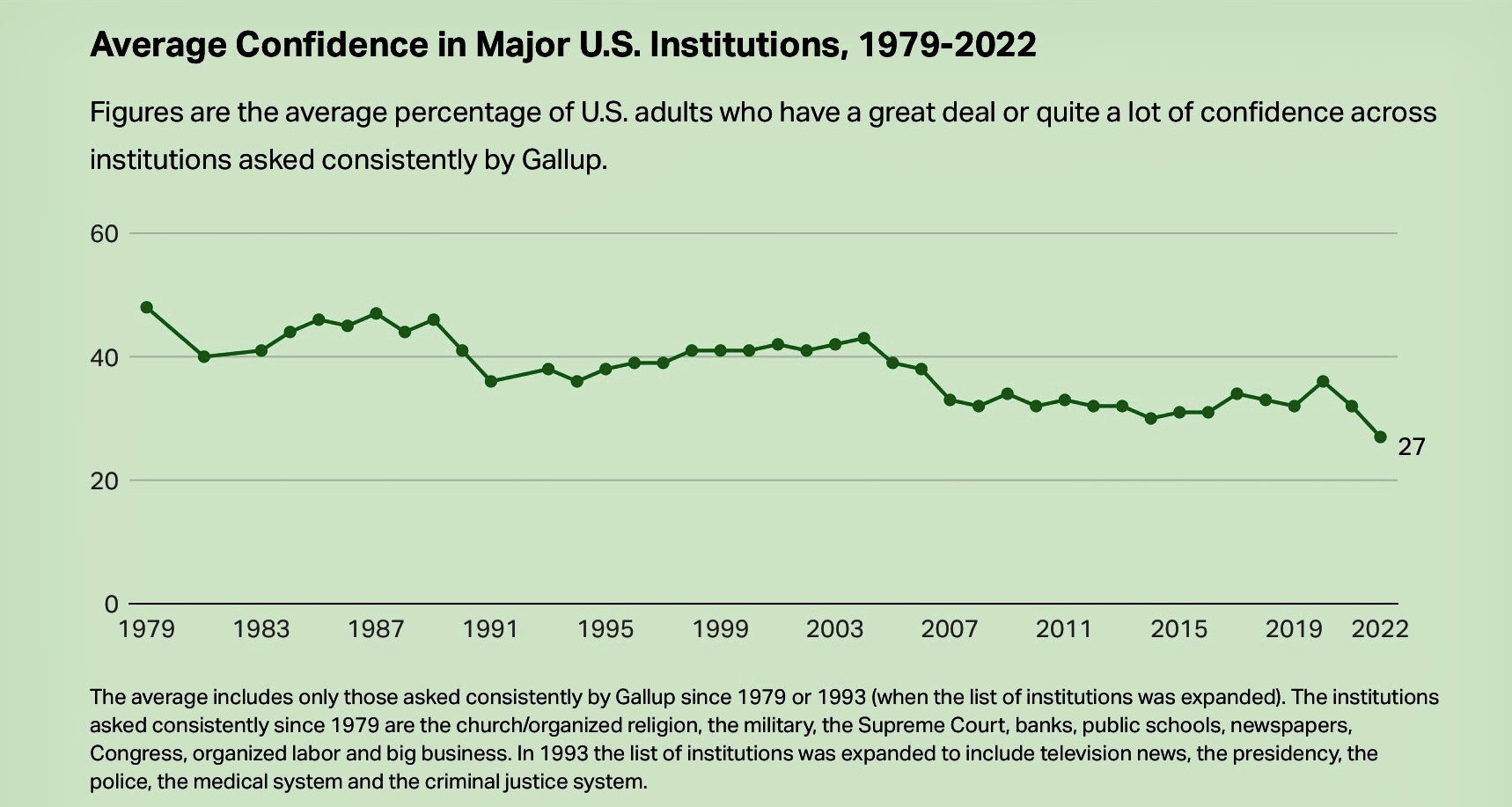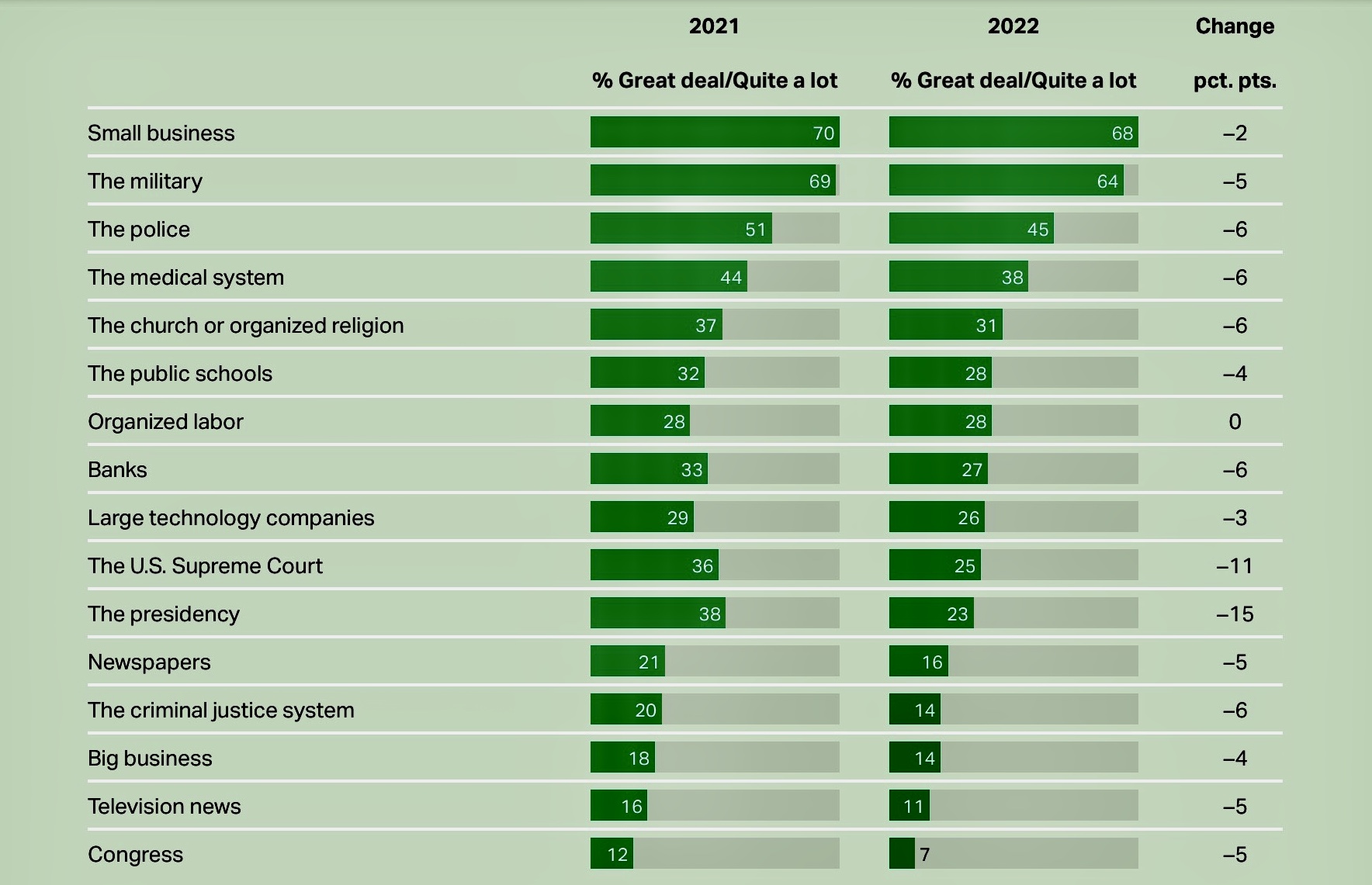So many U.S. institutions, so much failure
America is at a time of noisy peril.
Some of us can’t abide others of us.

Teachers are permitted to share their personal sexual experiences with third-graders, but no school child is required to pledge allegiance to the flag.
Sexual fluidity gets more attention than traditional values such as honesty and voting, and math is racist.
When did the craziness begin?
Trust in our institutions -- all of them -- are at record lows, according to Gallup. That has been widely reported and it should be alarming. And yet. . . .
What is not widely known is that very few national institutions ever earned more than 50% of Americans' confidence since Gallup started polling this issue in 1973. Have we always been so cynical?
Right now only two institutions — small business and the military — have confidence ratings of more than 50%. (Police had a 51% approval until this year.)
Everything else — religion, schools, medicine, TV news, Congress, newspapers, banks, major corporations, high-tech companies — don’t even approach the 50% mark.

Why the low grades for American institutions?
Gallup doesn’t say, but our institutions have been under attack for decades. Progressives in particular apply the test of moral purity to a vast array of people, organizations, and events in our history, with no regard for the context of the times.
No institution operates in a vacuum, and as human inventions, they are susceptible to errors.
It is perfectly understandable that confidence in the church would plummet in the wake of stories of priests preying on children.
How much confidence do you have in big tech when it starts cancelling only people with your point of view?
How many times do banks and Wall Street get to crash our economy before we hold them at arms length?
When the U.S. Supreme Court seems to be more oriented towards ideology than justice, confidence drops. Its highest rating was 56% in 1985. For the past decade it has hovered in the 30s. That’s pathetic.
One institution — the lowest-rated at 7% — Congress, offers a possible explanation for its dismal grades.
There are some issues on which most Americans agree.
Under our representative democracy, that should mean Americans get what they want.
But do we?
Abortion is our most divisive issue.
It certainly is the loudest, but Pew Research reports that 61% of Americans favor legal abortion in some or all cases.
In this case, and others, digging into the weeds of the survey will reveal minor divisions, but, overall, 6 in 10 Americans agree that abortion should be safe and legal.
Imagine their disappointment when the Supreme Court declared there was no right to an abortion.
The majority wants something, but neither Congress nor the Supremes furnish it. That builds anger and distrust.
An even greater majority of Americans want expanded background checks for gun purchases -- 83% of gun owners in one survey. I have seen polling as high as 91%, including a majority of NRA members.
There is less near-unanimity on other gun control measures, such as banning some types of weapons, but deeper background checks are very popular. Despite that, the recent congressional bi-partisan gun bill — the first in 30 years — expanded background checks only for those under 21.
You spoke. Congress ignored.
The last time Congress did anything meaningful on immigration was the Immigration Control and Reform Act of 1986,
It offered amnesty to millions of illegals and Congress promised to strengthen our borders. It did not do that. Hiring illegals was made unlawful, and we know how badly that worked out, but it was at least a stab at fixing the problem.
Today, polling by Ipsos says Americans want immigration restrictions and reforms, but get neither.
Pew Research finds majority support for single-payer health insurance be it government or a mix of public and private. But we don't get it.
Medicare is probably, with Social Security, the most popular government program. There is no real political risk in expanding it, so why not?
It’s a little baffling.
And if we are going to expand health coverage, which is happening over time, why not education?
A majority of Americans want free public higher education, according to an educational website citing Pew Research. Do we have it? No.
Those are a lof of “wants” from the public, whose opinion of Congress won’t improve until the Honorables start delivering.
As for the other institutions, a lot of honest introspection and repair are in order.
It starts with these questions: What do our customers/clients expect from us, and how do we deliver it?



